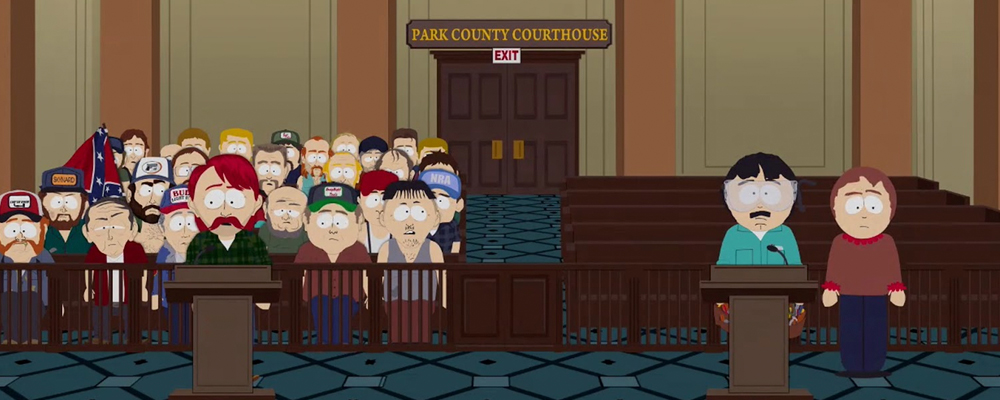‘South Park’ Season 21 Premiere Plants a Confederate Flag on the Property of ‘White People Renovating Houses’
Tony Sokol
Stan, Kyle, Cartman and Kenny, when you can hear him, have been a guiding voice for a confusing generation. They’ve given us a fourth-grade view of liberals, conservatives, 9/11, Obama, and the man who would be King Midas, Donald Trump. Viewers watched the show grow up, even if the kids never hit puberty, except Stan, but only for one episode. “South Park” expanded from crudely drawn cutouts to intricate animated tributes without losing their comic edge. “South Park” creators Matt Stone and Trey Parker played with form, including last season’s attempt at serialization, while skewering political and social content. Stone and Parker promise that season 21 will go back to the kids.
The Comedy Central mainstays also claim they’re gotten their fill of Trump, but in “White People Renovating Houses” the small town in Colorado is fully immersed in the ideals of the new presidency and the old confederacy. But their anger isn’t against a race or class of people. It is about progress crushing the under educated little guy. It’s enough to drive people to starting their own renovation reality show.
The episode title refers to Stan’s parents’ new media endeavor. Sharon and Randy Marsh are flipping houses. Randy is absolutely thrilled and throws himself into it, demolishing pesky walls with fancy kickboxing footwork. Sharon does the calculations, and manages to sound just a little bit annoyed while she carries the one. Stan’s dad is a reckless renovator. He doesn’t clear the cabinets before he takes a sledge hammer to them, bringing everything down on his head at the start of every job. His construction montage is a series of sight gags. He is an animated tribute to silent film star Buster Keaton.
The new show keeps getting interrupted by protests, Confederate Flag-waving white people protests. Big corporations are turning to automation and taking peoples’ jobs. Daryl, the most vocal of the displaced workers, gets into a pepper spray battle with Randy after one too many work stoppages.
Meanwhile, the kids are having their own technological battles. Cartman tasted what it’s like to get virtual assistant Alexa to add “big hairy balls” to his shopping list and knows he will never be satisfied with his girlfriend Heidi again. It becomes clear that Cartman is moving on to a new love and he’s doing it the coward’s way, through passive aggression. He gives all the usual excuses for pulling back, like his belief that mobile phones are the devil. But he is only putting off the inevitable: when he can find a way to break it off and lay the blame fully on Heidi.
Heidi doesn’t get it. She believes in a 50/50 relationship, and is actually willing to try for a 100/100 relationship, even though she knows that’s mathematically impossible. Cartman can only be happy with one of those 100s in the equation. Cartman convinces his friends he is being mentally abused by his girlfriend, but he can save her. He has always been so pathologically self-indulgent he makes narcissism an art. It is only a ploy to spend more time with his beloved virtual assistant, an affair that is about to become endangered.
The protestors and Marshes wind up in court. Randy sues for the damages his show is suffering from being linked with the white power movement because the show’s name has the words “white people” in it. “White People Renovating Houses” wasn’t Randy’s first choice for a title. It was what was left him. Competition is fierce. Everyone has a house flipping show. Gay people flip houses, Texans, little people flip big houses. Randy especially wants to end the horrid association to confederate flags, which he believes makes everyone look stupid and out of date. The court mandates a modern solution.
The revolution comes overnight as real people take over virtual jobs. Cartman wakes up to find some guy in a flannel shirt named Jim Bob replaced his beloved Alexa, and it’s not too cool. Jim Bob comes with a guitar and a GPS, but he also comes with backtalk. Alexa was a perfectly subservient companion. Her replacement is problematic.
The transition between the automated information givers and their human counterparts is seamless. But situation soon turns into “Westworld” in reverse. The regular guys who are doing the jobs of the artificially intelligent feel diminished, degraded. At least one of them does, Daryl. He is independent, lazy and wholly human.
Two classic “South Park” moments stand out in the opening episode: The lead-in to Cartman’s Heidi breakdown and Randy’s reaction to Daryl’s explosive breakdown. The marginalized worker stands up to his oppressors and vows violent retribution. The crescendo of hate ends with Daryl storming out to an uncertain future. “Woah, what the hell was that all about,” Randy asks.
Daryl isn’t really angry that Mexicans are having babies. He doesn’t want to build a huge wedge between people. He wants to open his living area but is hindered by a load bearing wall. Randy explains that Daryl doesn’t have to tear down the foundation of everything he knows. Reinforced steel can do the job just as easily and won’t put anyone out of work. Randy even includes Confederate Flags in the overall design of Daryl’s new, open living space.
Last season ended the post-funny era of satire in a burst of hatred that shut down the internet and forced the world to reboot. “White People Renovating Houses” is gentler and more subtle in its commentary. The attacks and the anger aren’t aimed at any usual suspects, and the solution is more inclusive, because the enemy isn’t common, it’s not even human. Everyone is in danger when technology replaces memory.
After 21 years on the air, it looks like “South Park” will stay relevant because they continue to find unexpected ways to skewer their subjects. Parker and Stone consistently find new angles to stick their comic knives. Sometimes the edges are a little dull, but when they go for the jugular they can do some serious damage, though never seriously. The opening episode might have benefited from a more jagged blade, but this season is about healing, and Cartman’s newfound freedom.
“South Park” premiered Sept. 13 and airs Wednesdays at 10 p.m. ET on Comedy Central.



